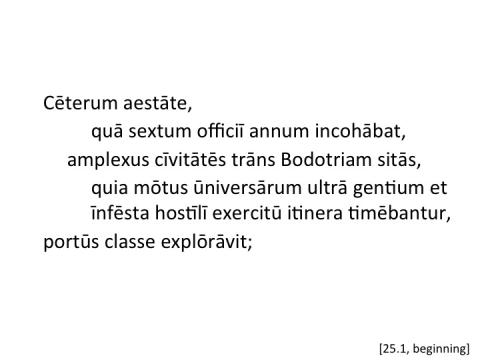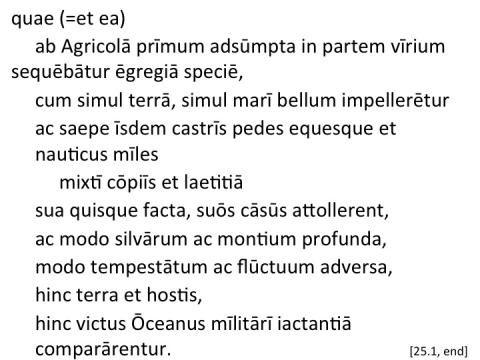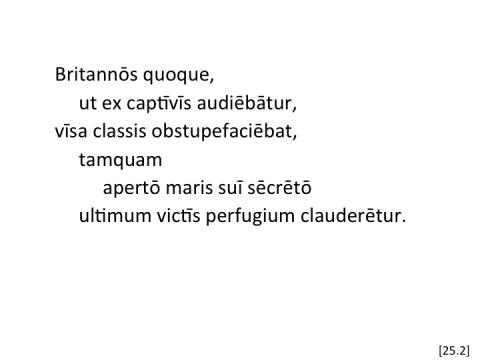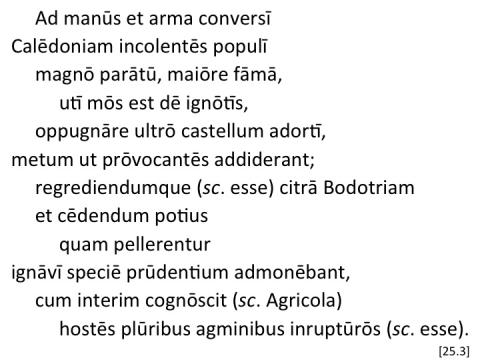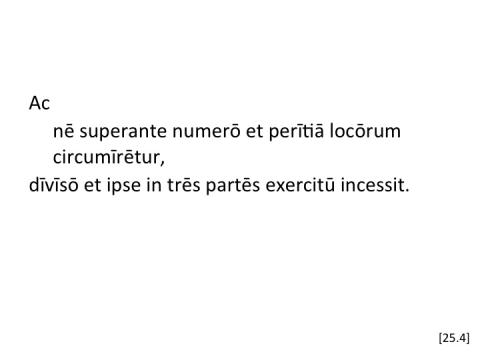Overview: In the sixth campaign army and fleet cooperate in a hostile demonstration along the eastern coast of Scotland; the Caledonians, in several divisions, begin offensive operations. (Stuart); this chapter begins on f. 59r of the codex Aesinas.
25.1
cēterum: used to denote a return to the narrative proper after the digression, precisely as in chapter 11.1. (Stuart)
sextum officii annum: 82 CE (for the date see Introduction). (Damon)
amplexus: animo is understood; "conceived a purpose to invade." In chapter 17.1, the word is used of hostile operations actually performed. (Stuart); “comprehending in his plan of campaign.” (Pearce)
trāns Bodotriam: the campaign was transferred from the west to the east. (Stuart)
ultrā: here used adjectivally with gentium. (Pearce) [A&G 321d]
īnfēsta hostīlī exercitū itinera: hostili exercitu is an ablative dependent on the verbal idea in infesta, "made unsafe," expressing the source of the danger and referring to the British army. This reading is present in the manuscript as a marginal correction (see the right-hand column); the reading in the main text is hostilis exercitus. Each reading has been adopted by some editors, and other editors emend the text (see notes below). (Damon) [A&G 403] īnfēsta hostīlis exercitus itinera: hostīlis exercitus refers to the Romans. Translate: “marches by land which are fraught with peril for an attacking army.” (Stuart) īnfēsta hostibus: “beset by the enemy.” hostibus, ablative of means. (Pearce) [A&G 409] exercitus itinera: go together. (Pearce)
in partem vīrium: “to form part of his force.” The fleet had probably been used by previous commanders merely for transport service, and was now for the first time combined with the army in offensive operations. (Pearce) prīmum adsūmpta in partem vīrium: prīmum must not be too closely pressed, for, if we take it in the sense of tunc prīmum, the statement would be at variance with ch. 24.1; if understood to mean that he was the first Roman governor of Britain to do so, the assertion is also questionable. Observe how in the following paragraph the style at once assumes a rhetorical coloring in passing from plain narrative to vivid description, here seen in the use of anaphora, libration of clauses, poetic or peculiar phrases, and oxymoron. (Gudeman)
ēgregiā speciē: “with impressive effect.” (Stuart) ēgregiā speciē: sc. rēs. Ablative of quality with the usual ellipsis. (Gudeman) [A&G 415]
simul ... simul: a Vergilian correlation, found in Livy and often in Tacitus. (Gudeman)
bellum impellerētur: a more graphic bellum īnfērrī; “hostilities were pushed forward.” (Stuart); the verb belongs strictly speaking only to marī, and is joined to terra by a slight zeugma. The phrase is poetic and occurs only here. (Gudeman)
īsdem castrīs: notice the omission (frequent in Tacitus) of in with local ablative. (Pearce) [A&G 421]; on the ablative of place where, see note ch. 12.5. (Gudeman)
pedes equesque: closely joined as together constituting the land forces. (Stuart); "the army," the two terms joined by -que forming one group, to which et adds nauticus mīles, “the navy.” (Gudeman)
mixtī cōpiīs et laetitiā: “pooling rations and merrymakings;” in other words, “they messed together and made merry.” Such combinations of the abstract and concrete illustrate the taste of Tacitus for the unusual in expression. See Introduction, p. xxiii. Similar turns are used both in English and in Latin for comic effect. See Lewis Carroll, Hunting of the Snark: “pursued him [sic] with forks and hope.” (Stuart); “joyfully sharing their rations.” On the collocation of the concrete and abstract, see Introd. p. xxxiv, #1. (Gudeman)
attollerent: “vaunt.” (Stuart) attollerent: sc. laudibus, “praised to the skies.” With this meaning the absolute use of the verb is poetic, but very common in Tacitus. (Gudeman)
silvārum ... profunda: see note on extrēma ... terrārum, 12.4. (Pearce)
modo ... adversa: observe the symmetrical libration. (Gudeman)
hinc terra et hostis: corresponds to silvārum ... profunda; hinc victus Ōceanus to tempestātum ... adversa. (Pearce)
hinc ... hinc: for inde (viz. pedes equesque) ... hinc (viz. nauticus mīles). This correlation is also Vergilian. (Gudeman)
victus: to be joined also with terra and hostis. Render by a substantive. (Stuart)
mīlitārī iactantiā, etc.: the passage bears a remarkable resemblance to Lucan, Phars. IV.196 ff., et mīles, castrīs permixtus ... concordēs cespite mēnsās / īnstituunt... Extrahit īnsomnēs bellōrum fābula noctēs. Quō prīmum steterint campō, quō lanceadextrā / Exierit. Dum, quae gessērunt fortia, iactant. (Gudeman)
25.2
Britannōs quoque ... obstupefaciēbat: quoque with Britannōs, not with the whole sentence, as the Romans were not also obstupefactī. “As for the Britons on their part (quoque), they were amazed at the sight of the fleet.” See 12.6 gignit et Ōceanus margarīta. (Pearce) Britannōs: Tacitus uses the word in a broad sense to include the Caledonians. (Stuart) Britannōs quoque: this is slightly illogical, owing to a desire for conciseness, for the Romans of course were not stupefied at the sight of the fleet, but were on the contrary inspired with enthusiasm. (Gudeman)
tamquam: the thought of the Britons. (Stuart) tamquam: "believing as they did." See note ch. 15.3. (Gudeman)
apertō ... clauderētur: imitate in English the oxymoron, i.e. the verbal play involved in the connection of contradictory terms. (Stuart)
25.3
ad manūs et arma: “to armed conflict,” the second word defining the first. (Stuart); the more specific term added to the generic, on which see Introd. p. xxx, #17. Observe the ellipsis of igitur. (Gudeman); possibly hendiadys. (Lahiri)
utī mōs est, etc.: explains the exaggeration of the reports. See 30.3 omne ignōtum prō magnificō est. (Pearce)
oppugnāre: with adorti. (Pearce)
ultrō: they took the initiative in assuming the offensive; ultro possesses the underlying meaning of that which is beyond what one would naturally expect. (Stuart)
adortī: here, "having ventured"; more frequent in the sense of "attack." (Stuart)
metum ... addiderant: viz. to the alarm occasioned by the preparations themselves and the exaggerated reports of them. The expression is very concise. (Pearce)
regrediendum: sc. esse. (Damon) regrediendum ... potius quam pellerentur: see Cic. Tusc. 2.52 perpessus est omnia potius quam cōnsciōs … indicāret, “he suffered everything rather than betray his accomplices.” Here it rejects an alternative course of action. The subj. is final owing to the idea of prevention. (Pearce) [A&G 531.2 and 558b] citrā: "beyond." Here in its regular, local sense, see note ch. 1.3. (Gudeman) quam pellerentur: the subjunctive to denote an act which is anticipated and deprecated. Quam ut is another possible expression. (Stuart) [A&G 592] quam = quam ut after magis, potius, etc. (Gudeman) [A&G 535c]
speciē: “under the guise (of),” “posing (as).” (Pearce)
cognōscit: sc. Agricola. The subject is easily supplied, because the report of the council of war (regrediendum ... admonebant) necessarily implies the presence of the commanding general. (Gudeman)
plūribus = complūribus. (Pearce)
inruptūrōs: sc. esse. (Damon)
25.4
superante numerō et perītiā locōrum: superante goes with both nouns, “because of the superiority of the enemy in number and in acquaintance with the country.” (Stuart) superante numerō ... circumīrētur: “lest he be surrounded, owing to the enemies' superior numbers, and put at a disadvantage by reason of their knowledge of the territory.” numerō is an instrumental, perītiā a causal ablative, circumīrētur being used ... in its regular sense with numerō, figuratively with perītiā. See Introd. p. xxxii, #7. (Gudeman)
dīvīsō et ipse ... exercitu: notice the position of ipse in the ablative absolute. It is logically the subject of the action denoted by the abl. abs. phrase. See note on ipsi, 1.3. (Pearce); et ipse, “likewise"; for that the enemy could attack him from three sides, the north, west, and south, it was not necessary to point out expressly. et ipse is a favorite phrase in Tacitus. (Gudeman)

